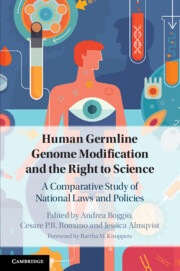 Human Germline Genome Modification and the Right to Science
Human Germline Genome Modification and the Right to Science Book contents
- Human Germline Genome Modification and the Right to Science
- Human Germline Genome Modification and the Right to Science
- Copyright page
- Dedication
- Contents
- Figures
- Tables
- Notes on Contributors
- Foreword
- Preface
- Acknowledgments
- Abbreviations
- 1 Introduction
- 2 The Governance of Human (Germline) Genome Modification at the International and Transnational Levels
- The Regulation of Genome Modification at the National Level
- Part I North America
- 3 The Regulation of Human Germline Genome Modification in Canada
- 4 The Regulation of Human Germline Genome Modification in the United States
- 5 The Regulation of Human Germline Genome Modification in Mexico
- Part II Europe
- Part III Asia
- Part IV Other OECD Countries
- Part V Conclusions
- Index
4 - The Regulation of Human Germline Genome Modification in the United States
from Part I - North America
Published online by Cambridge University Press: 15 November 2019
- Human Germline Genome Modification and the Right to Science
- Human Germline Genome Modification and the Right to Science
- Copyright page
- Dedication
- Contents
- Figures
- Tables
- Notes on Contributors
- Foreword
- Preface
- Acknowledgments
- Abbreviations
- 1 Introduction
- 2 The Governance of Human (Germline) Genome Modification at the International and Transnational Levels
- The Regulation of Genome Modification at the National Level
- Part I North America
- 3 The Regulation of Human Germline Genome Modification in Canada
- 4 The Regulation of Human Germline Genome Modification in the United States
- 5 The Regulation of Human Germline Genome Modification in Mexico
- Part II Europe
- Part III Asia
- Part IV Other OECD Countries
- Part V Conclusions
- Index
Summary
The United States does not yet have a comprehensive legal regime to manage germline editing. However, the US Congress, which appropriates funds annually to support the Food and Drug Administration (FDA), has enacted a rider that prevents the agency from using those funds to receive applications for clinical trials. In this manner, Congress has imposed a de facto moratorium that prevents scientists from creating children with modified genomes. In most of the fifty states, scientists remain free to edit human gametes and embryos in the lab as long as they mind federal regulations governing research.In the future, Congress and state legislatures may ban germline editing, in whole or in part. Such bans may face legal challenges. To be sure, the United States has not ratified the International Covenant on Economic, Social and Cultural Rights, and is not bound by its requirement that parties respect scientific freedom. Nor does the US Constitution expressly state a right to engage in scientific research. However, some academics argue that such a right can be derived from the First Amendment. Further, those who cannot conceive a healthy child without germline editing may claim that a ban violates their constitutional right to privacy.
Keywords
- Type
- Chapter
- Information
- Human Germline Genome Modification and the Right to ScienceA Comparative Study of National Laws and Policies, pp. 103 - 128Publisher: Cambridge University PressPrint publication year: 2020
- 2
- Cited by
